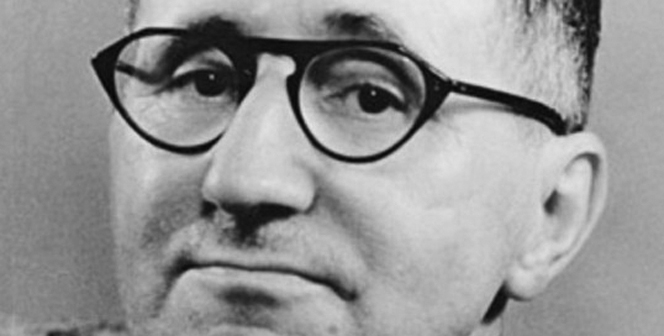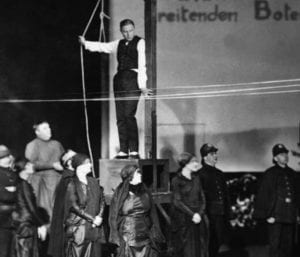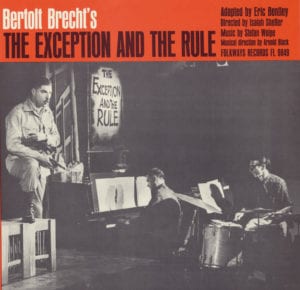
- This event has passed.
6 Plays of Bertolt Brecht

Beginning April 23 we will read aloud six of the many plays Bertolt Brecht wrote between the 1920s and his death in 1956. We will spend three weeks with The Threepenny Opera, one week with The Exception and The Rule, and two weeks each for the other four plays. There will be time to read aloud—taking on various characters among ourselves. There will also be substantive discussion of these works which span all the decades of his writing. The Epic theater, musical theater along with the learning plays are represented in this selection of plays. Each session will be conducted via Zoom until we have an all-clear to return to the classroom. With your registration, the zoom password will be sent to you.
The Threepenny Opera 1928
The Threepenny Opera (Die Dreigroschenoper) is a “play with music” by Bertolt Brecht, adapted from a translation by Elisabeth Hauptmann of John Gay’s 18th-century ballad opera, The Beggar’s Opera, and four ballads by François Villon, with music by Kurt Weill. The work offers a socialist critique of the capitalist world. Writing in 1929, Weill made the political and artistic intents of the work clear: “With the Dreigroschenoper we reach a public which either did not know us at all or thought us incapable of captivating listeners, Opera was founded as an aristocratic form of art. If the framework of opera is unable to withstand the impact of the age, then this framework must be destroyed…. In the Dreigroschenoper, reconstruction was possible insofar as here we had a chance of starting from scratch. Weill claimed at the time that “music cannot further the action of the play or create its background”, but achieves its proper value when it interrupts the action at the right moments.”
The Mother 1931
Based on Maxim Gorky’s 1906 novel of the same name, is Brecht’s most elaborate use of his radically experimental Lehrstücke, or learning plays, which he describes as “a piece of anti-metaphysical, materialistic, non-Aristotelian drama.” The play suggests that to become a good mother involves more than just complaining about the price of soup; rather, one must struggle against it, not only for her and her family’s sake, but for the sake of all working families. The title character, the mother Pelagea Vlassova, journeys through the play’s 14 scenes, the death of her son, and her own impending illness, fighting illiteracy while constantly filled with good humor and wily activism. The moment in October 1917 when she becomes free to carry and raise her own Red Flag on the eve of the czar’s overthrow proves momentous.
The Exception and the Rule 1933
The play itself is short, and lasts no longer than 60 minutes if performed in its entirety. It tells the story of a rich merchant, who must cross the fictional Yahi Desert to close an oil deal. During the trip the class differences between him and his working-class porter (or “coolie” as he is called in most English language editions) are shown. As he becomes increasingly afraid of the desert, the merchant’s brutality increases, and he feels terribly alone without police nearby to protect him.
Mother Courage & Her Children 1941
Following Brecht’s own principles for political drama, the play is not set in modern timesbut during the 30 Years’ War of 1618–1648. It follows the fortunes of Anna Fierling, nicknamed Mother Courage, who is determined to make her living from the war. Over the course of the play, she loses all three of her children, Schweizerkas, Eilif, and Kattrin, to the very war from which she tried to profit. Mother Courage is an example of Brecht’s concepts of epic theatre and Verfremdungseffekt, or “V” effect; preferably “alienation” or “estrangement effect” Verfremdungseffekt is achieved through the use of placards which reveal the events of each scene, juxtaposition, actors changing characters and costume on stage, the use of narration, simple props and scenery.
The Good Person of Szechwan 1943
Brecht’s interest in historical materialism is evident in the play’s definition of contemporary morality and altruism in social and economic terms. Shen Teh’s altruism conflicts with Shui Ta’s capitalist ethos of exploitation. The play implies that economic systems determine a society’s morality.
The Resistible Rise of Arturo Ui 1958
It chronicles the rise of Arturo Ui, a fictional 1930s Chicago mobster, and his attempts to control the cauliflower racket by ruthlessly disposing of the opposition. The play is a satirical allegory of the rise of Adolf Hitler and the Nazi Party in Germany prior to World War II. The play has frequent references to Shakespeare. To highlight Ui’s evil and villainous rise to power, he is explicitly compared to Shakespeare’s Richard III. Like Macbeth, Ui experiences a visitation from the ghost of one of his victims. Finally, Hitler’s practiced prowess at public speaking is referenced when Ui receives lessons from an actor in walking, sitting and orating, which includes his reciting Mark Antony’s famous speech from Julius Caesar.


